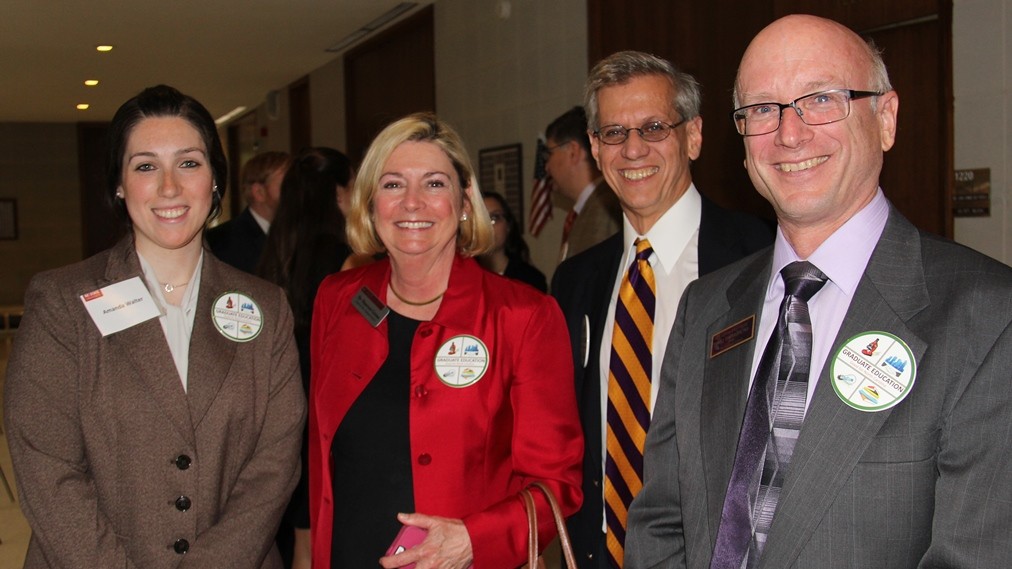Dean’s Scene: Welcome to the Pack, and Be Ready For Social Networking Opportunities

by Dr. Maureen Grasso,
Dean, The Graduate School
Welcome to all! First to our graduate students just beginning their academic experience with us — a hearty “Welcome to the Pack” and, to our returning graduate students, we are pleased you are here, and we look forward to helping you achieve your goals and seeing you at commencement in the near future. As you get settled in, I hope that you’ll stop by our offices at 1000 Main Campus Drive to get to know us, as we get to know you. We are here to help make your graduate experience as smooth as possible.
Why am I writing? Given my experience as a Graduate Dean and a “seasoned” faculty member, I love the opportunities that the university community provides to be a lifelong learner. The Graduate School has so much to offer throughout your academic career. Take advantage of the workshops we offer to help you improve your writing, teaching and research skills. You’ll receive regular updates on these programs, and you can also visit our website to learn more: www.ncsu.edu/grad
Now, the real reason I’m writing is that, with the beginning of the school year come social opportunities to mingle with faculty and others in your programs and departments. Such events provide great opportunities for networking with those in your chosen profession, but they can also be somewhat awkward, especially when you are new to the group. Even as faculty members, when we go to conferences and want to “network,” it can sometimes feel that way.
This summer, I attended an insightful workshop on, “How to Navigate the Reception.” This session at a national conference for graduate school deans was packed with “seasoned” faculty/graduate deans wanting more experience in how to “network.” I thought I would share some insights with you that we as graduate deans learned and experienced ourselves. Hopefully, these ideas will help you feel more comfortable – and make a great first impression – at professional and social events.
How do you enter a group conversation, or walk away from one? How should you introduce yourself? What’s the best way to handle food and drink so you can continue to be engaged with your colleagues? Here are some great tips on networking etiquette that I wanted to share:
- Plan what you’ll wear to give the right impression – “business casual” doesn’t mean that you should be the worst dressed at the event. Wear your name tag on the right side so people can read it when you extend your hand to introduce yourself.
- Eat before you go so you’ll have more time for networking at the event. If you do choose to eat at the event, select foods you can eat with a toothpick or fork to keep your hands clean. Keep your drink in your left hand so your right hand is free when meeting others. Figure out how you will balance food, drink and meeting people all at once – don’t overload your hands. Think about what you will do with that toothpick after you have eaten the small appetizer – you may decide to pass on the appetizer if there is no place to dispose of the toothpick.
- Mingle! Avoid groups engaged in heavy conversation; look for those where body language suggests they are open to others joining. Approach the group, make eye contact, and ask if you may join them.
- When making introductions, shake hands and repeat the name of the person you’ve just met: “Libby, it’s good to meet you.”
- If you hand out business cards, present the card so the receiver can read your name. When you receive a business card, pay attention to the person’s name, title and employer.
- To engage in small talk, ask questions of others. People love to share information about themselves, and you’ll never be short of something to talk about when you ask people questions about themselves.
Events at someone’s home are a little different, usually smaller and more intimate. To be considerate of your host and fellow guests, follow these tips.
- Don’t arrive early – your host will still be involved in preparations. The best time to arrive is within 15 minutes after the event’s start time.
- Offer your help by saying, “Can I do anything to help?” instead of “What can I do to help?” This allows your host to politely decline your help.
- Bring a gift for the host – wine, flowers – but make it something that doesn’t put your host to work. Flowers in a vase with water are fine; avoid flowers wrapped in plastic that require your host to find a vase, arrange the flowers, etc.
- Stay off the phone. In small groups, you should leave your phone behind or put it on silent. If you are expecting a call you have to take, let your host know this and apologize if you must take a call during the party.
Even after years of mingling at conferences all over the world, I found these tips helpful for building confidence when I approach large or small social experiences. I hope you’ll find some value in these too, as you meet new colleagues this semester and move on to professional conferences in the future.
- Categories:


